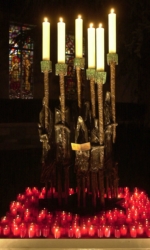Top Vatican official to attend Holocaust memorial rededication
BRAINTREE -- The Vatican’s top official on Catholic-Jewish relations will attend in March the rededication of a Holocaust memorial menorah that symbolizes the close relationship between the Catholic and Jewish communities in Boston.
Cardinal Walter Kasper, president of the Pontifical Council for Promoting Christian Unity and the Pontifical Commission for Religious Relations With the Jews, was invited to the event by Cardinal Seán P. O’Malley the day after the cardinal met with local Jewish leaders and Holocaust survivors to address their concerns generated by the pope’s decision to lift the excommunication of Bishop Richard Williamson, a traditionalist bishop who has denied the Holocaust.
The Yom Hashoah Menorah, which honors the victims of the Holocaust, was presented to the archdiocese by Jewish leaders as a symbol of the warm relationship between the two faiths in Sept. 2002 and was dedicated at the grounds of the former chancery in Brighton by Cardinal Bernard Law. It depicts six men and women holding torches, a holy man clutching a prayer book in front of the statue and a cracked Star of David, inscribed with the years 1933-1945. The first words of a Jewish prayer, the Kaddish, exulting God’s great name are at its base.
The Holocaust memorial will be moved to the archdiocese’s Pastoral Center in Braintree and rededicated March 25.
Cardinal Kasper’s coming to be a part of the event is significant because, “he is the spokesperson for the Holy Father, for the Holy See, in matters pertaining to Catholic-Jewish relations,” Cardinal O’Malley told The Pilot in a Feb. 25 interview.
“He is a man who is very versed in these issues and very committed to safeguarding the special relations the Catholic Church has with the Jewish community.”
The meeting with Jewish leaders took place Feb. 23 at a downtown Boston building that hosts several Jewish organizations. Around 15 Jewish leaders were present.
The cardinal described the encounter as, “a very good meeting that demonstrated the appreciation of the wonderful and close relationship that the Catholic and the Jewish community have had in Boston since the time of Cardinal Cushing.”
“It was a very important opportunity for us to assure the Jewish community that the Catholic Church repudiates the Holocaust denial.”
Father David Michael, archdiocesan liaison for interreligious relations, who was also present at the meeting, said that as soon as news of Archbishop Williamson’s remarks came to light, the cardinal offered to visit with representatives of the Jewish community to convey the Church’s condemnation of those remarks. He also said the cardinal wanted to assure them that the advances made after the Second Vatican Council in Catholic-Jewish relations were not in jeopardy.
“He was right on top of it.,” Father Michael said.
According to Father Michael, Cardinal O’Malley agreed to meet immediately but the date was delayed because of scheduling conflicts.
Father Michael described the meeting as very respectful and as an opportunity for the Jewish leaders to voice their concerns.
“We were in listening mode, and they were in sharing mode” Father Michael said.
Several Jewish leaders and Holocaust survivors spoke at the meeting relating their experiences and expressing their anguish at the denial of the Holocaust by what they perceive to be a “high ranking Catholic official, a bishop,” Father Michael said.
Father Michael said the cardinal contextualized those remarks by pointing out that Bishop Williamson is a “renegade Catholic.”
According to the cardinal, the Jewish leaders also expressed concern over websites related to the Fraternity of St. Pius X, the group Bishop Williamson is affiliated with,which contained charges of deicide against the Jews.
The cardinal told them that he was under the impression that most Catholics who are close to the Fraternity were there because of their love for the Tridentine Mass, but were not aware of the leadership’s ideological views.
“The point I tried to make was that it is very important that the Holy Father succeeds in trying to reconcile these people with the Church, otherwise the leadership they have could poison people’s minds with these false ideas,” the cardinal said.
He also explained that the lifting of the excommunication was a required step to start a process of dialogue to try to bring unity, but that “their full incorporation and reconciliation with the Church depends upon their acceptance of the teachings of the Second Vatican Council, which are not negotiable.”
Rob Leikind, Director of the Boston Chapter of the American Jewish Committee, who was present at the meeting called it “very valuable.”
“It was clear there was an appreciation about why people were concerned,” he said.
Speaking about the transferring of the menorah from the old chancery grounds to the Pastoral Center, the cardinal said that plans were already in the works, but the current events offered, “an opportunity to finalize those plans and to have the installation of the menorah as part of a Holocaust memorial service.”
Leikind welcomed the celebration of a Holocaust memorial service at the new Pastoral Center.
“The idea that his Eminence and the archdiocese want to keep that symbol close is an affirmation of all that we have been working towards.”
“The menorah was a very meaningful symbol of our shared commitment to overcome historic suspicion and hostility and build a genuine community of understanding in Boston,” he said.



















